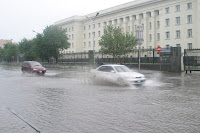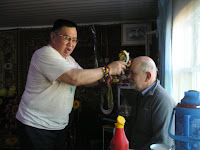
 Yes, my adventures in Mongolia have come to an end... On Tuesday the 12th of August I took the flight from Ulaanbaatar to Seoul, and then made my way from Korea back to London. Gana came to the airport to say goodbye and performed a Mongolian farewell ceremony (on the steps of the airport building!). She sprinkled milk into the air to wish me a safe journey. It was very sweet of her to do this, and it seemed the perfect way to end off my experience in Mongolia. I boarded the plane and said goodbye to the country that will always remain in my heart.
Yes, my adventures in Mongolia have come to an end... On Tuesday the 12th of August I took the flight from Ulaanbaatar to Seoul, and then made my way from Korea back to London. Gana came to the airport to say goodbye and performed a Mongolian farewell ceremony (on the steps of the airport building!). She sprinkled milk into the air to wish me a safe journey. It was very sweet of her to do this, and it seemed the perfect way to end off my experience in Mongolia. I boarded the plane and said goodbye to the country that will always remain in my heart. It was sad to say farewell to all the friends that I had made, both fellow VSO volunteers and Mongolian people. I had made some good friendships, even with locals who did not speak English very well - something that I did not really imagine I could do before I came. It was also sad to wave goodbye Mongolia's beautiful landscape, complete with ger tents and mountains (which looked even more fantastic from my viewpoint in the plane). However, in the back of my mind I think I will go back to Mongolia at some stage, so my goodbye was not as painful or as final as it could have been.
It was sad to say farewell to all the friends that I had made, both fellow VSO volunteers and Mongolian people. I had made some good friendships, even with locals who did not speak English very well - something that I did not really imagine I could do before I came. It was also sad to wave goodbye Mongolia's beautiful landscape, complete with ger tents and mountains (which looked even more fantastic from my viewpoint in the plane). However, in the back of my mind I think I will go back to Mongolia at some stage, so my goodbye was not as painful or as final as it could have been.  It's strange to think that a year has passed since I left the UK, it certainly doesn't feel as long as that (which I guess is definitely a positive). Whilst there have been times when I have found life tough (problems at work, missing family, cultural challenges and the language barrier), overall my experience was fantastic. My family asked me if I'd do the year again, knowing full well what would await me. My answer would be a resounding yes - every day was different, my job was interesting and I made some really great friends. It will now be a challenge to readjust back to British life...
It's strange to think that a year has passed since I left the UK, it certainly doesn't feel as long as that (which I guess is definitely a positive). Whilst there have been times when I have found life tough (problems at work, missing family, cultural challenges and the language barrier), overall my experience was fantastic. My family asked me if I'd do the year again, knowing full well what would await me. My answer would be a resounding yes - every day was different, my job was interesting and I made some really great friends. It will now be a challenge to readjust back to British life... However, something that has soften my fall back to normality has been the chance to see my family and friends again. In particular, it has been great to see my little niece Matilda. She has changed so much in the last year, and can now call out my name (bizarrely enough in the same way that Mongolians did - "Robi!"). I now prepare for a new adventure - I start a job in London in three weeks. I've never lived in London before, so this will also be a new experience for me. Wish me luck!
However, something that has soften my fall back to normality has been the chance to see my family and friends again. In particular, it has been great to see my little niece Matilda. She has changed so much in the last year, and can now call out my name (bizarrely enough in the same way that Mongolians did - "Robi!"). I now prepare for a new adventure - I start a job in London in three weeks. I've never lived in London before, so this will also be a new experience for me. Wish me luck!Thanks to all of you who read this blog. I hope you've enjoyed it - I've certainly enjoyed sharing my experiences in my updates. I wish you all the very best, and if any of you want to find out more about Mongolia or about volunteering with VSO please feel free to email me at schlinerATtalk21.com. Take care of yourselves, the best of Mongolian luck to you all,
Robert


























 On Tuesday evening, the 1st of June, a large scale protest broke out at the headquarters of the leading party in Mongolia, the MAXN (the ex-Communist Mongolian People's Revolutionary Party). Masses of people congregated at the square outside the headquarters, and a select few began attacking and looting the building. Clashes between the protestors and the police occurred throughout the night, and some protesters attacked a local police station. By the end of the evening the whole building was in flames, and 5 people had died. It was the first time in living memory that Mongolians had risen up in a violent protest.
On Tuesday evening, the 1st of June, a large scale protest broke out at the headquarters of the leading party in Mongolia, the MAXN (the ex-Communist Mongolian People's Revolutionary Party). Masses of people congregated at the square outside the headquarters, and a select few began attacking and looting the building. Clashes between the protestors and the police occurred throughout the night, and some protesters attacked a local police station. By the end of the evening the whole building was in flames, and 5 people had died. It was the first time in living memory that Mongolians had risen up in a violent protest.



 The last few weeks I’ve been busily working to prepare for the annual VSO Mongolia Volunteers’ Conference. One of my responsibilities as Ulaanbaatar Volunteer Representative (yes, very grand title I know!) was to help with the preparations and running of this conference. Thus, I’ve been working with fellow volunteer Ruth and VSO Mongolia director Alison, to ensure that everything was ready. We made great efforts so that the volunteers were properly consulted about and could feed into all aspects of the conference (the agenda, the menu, transport arrangements, etc).
The last few weeks I’ve been busily working to prepare for the annual VSO Mongolia Volunteers’ Conference. One of my responsibilities as Ulaanbaatar Volunteer Representative (yes, very grand title I know!) was to help with the preparations and running of this conference. Thus, I’ve been working with fellow volunteer Ruth and VSO Mongolia director Alison, to ensure that everything was ready. We made great efforts so that the volunteers were properly consulted about and could feed into all aspects of the conference (the agenda, the menu, transport arrangements, etc).












